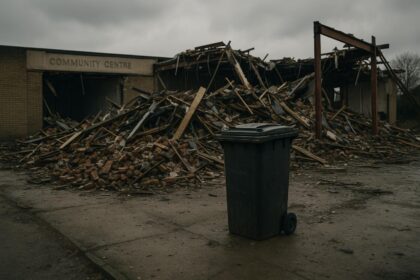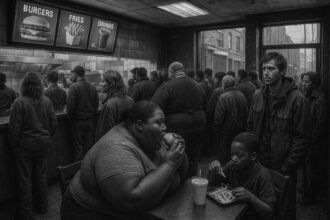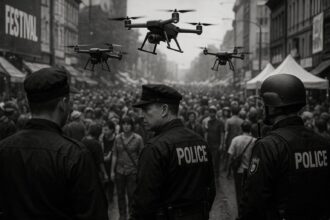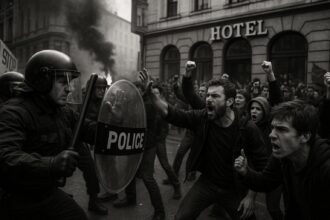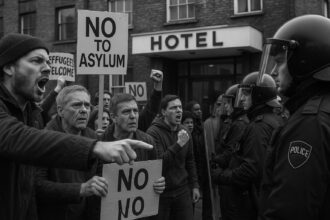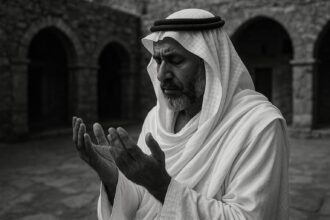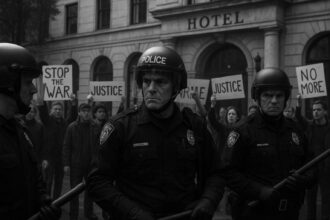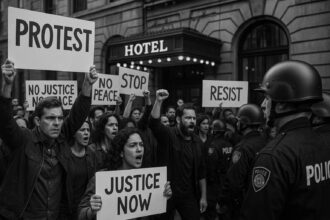France’s youngest-ever prime minister, Gabriel Attal, embraces a renewed partnership with the UK driven by the war in Ukraine and global uncertainty, while positioning himself as a key player in France’s political future and advocating bold social and defence policies.
In a recent visit to London, Gabriel Attal—the dynamic leader of Emmanuel Macron’s Renaissance party and France’s youngest-ever prime minister—spoke candidly about the evolving relationship between France and the United Kingdom post-Brexit. Addressing a gathering of French expatriates in Kensington, Attal emphasised that, despite earlier fears of severed ties, a new phase of cooperation is emerging, driven by geopolitical shifts like the war in Ukraine and turbulence in the United States. “We are waking at the moment from a long sleep when we talk about relations between France and the UK,” he said, underscoring the necessity of rekindling strong bilateral ties especially in defence, economy, energy, and immigration cooperation.
Attal’s political trajectory has been marked by rapid advancement and record-breaking appointments. At 29, he became France’s youngest postwar minister, and at 34, he was appointed prime minister. Although his premiership was cut short following a snap election, Attal remains a central figure in Macron’s centrist camp and is widely seen as a likely successor in the 2027 presidential race. While he has yet to formally declare his candidacy, he is openly “working on it,” signalling his intent to build a project-oriented campaign that distinguishes him from other contenders. In line with this vision, his party has proposed measures addressing social issues such as teenage screen addiction and immigration control, including controversial proposals to ban headscarves in public for girls under 15—a move that has sparked debate and cautious distancing from some within Renaissance.
On immigration and security, Attal advocates for deeper collaboration with the UK, highlighting Macron’s upcoming state visit that will include bilateral discussions at Windsor Castle. He stresses that the UK, alongside France, remains a critical military power on the European continent and that cooperation on defence and immigration aligns with mutual strategic interests. Attal mentions ongoing negotiations about UK access to the new €150 billion EU armaments fund, indicating a pragmatic openness to enhanced military ties despite financial and political complexities. Furthermore, he is keen on forging a joint approach to the EU’s forthcoming asylum and immigration pact, which seeks to streamline migrant processing and shares responsibility for new arrivals among member states—an especially pertinent issue since approximately 30% of immigrants to Europe aim to reach the UK.
European integration and geopolitical stability remain central to Attal’s agenda. He supports an accelerated path for Ukraine’s EU membership despite resistance from countries like Hungary and concern from European farmers. Hosting a summit in Paris, Attal spearheaded efforts to include Ukrainian observers in the European parliament and to use frozen Russian assets to aid Ukraine’s defence. He advocates for leveraging all diplomatic channels to circumvent obstacles within the EU accession process, reflecting his reputation for navigating political complexities with confidence.
Attal’s social policies blend liberal and authoritarian elements. He supports constitutional protection for abortion rights while endorsing measures that curb religious symbols in public schools, an approach framed as protecting girls from oppressive cultural practices. Critics, however, accuse him of politicising vulnerable groups for headline-grabbing purposes. His stance reveals a broader commitment to secularism and state authority in social affairs, consistent with the centrist yet firm governance style associated with Macron’s Renaissance.
Domestically, Attal also positions himself as an advocate for confronting the rise of the far-right populism embodied by Marine Le Pen’s National Rally. He warns that such forces threaten to dismantle France’s European commitments and economic stability, drawing parallels with the industrial setbacks Britain experienced post-Brexit. His efforts to reinforce the pro-European centrist vision aim to safeguard France’s position on the continent and beyond in an era marked by uncertainty and shifting alliances.
In sum, Gabriel Attal emerges as a figure seeking to renew France’s political centre with a clear-eyed emphasis on international partnership, social regulation, and pragmatic governance. His London visit and public statements reveal a leader crafting a narrative of renewal, defence cooperation, and moderating France’s internal debates—all with an eye on the presidency and France’s role in a turbulent Europe.
 Reference Map:
Reference Map:
- Paragraph 1 – [1], [2]
- Paragraph 2 – [1], [6]
- Paragraph 3 – [1], [2], [5]
- Paragraph 4 – [1], [2]
- Paragraph 5 – [1], [4]
- Paragraph 6 – [1], [3], [5]
- Paragraph 7 – [1], [6]
Source: Noah Wire Services
- https://www.theguardian.com/world/2025/jun/23/gabriel-attal-interview-uk-france-relations-macron – Please view link – unable to able to access data
- https://www.theguardian.com/world/2025/jun/23/gabriel-attal-interview-uk-france-relations-macron – In an interview with The Guardian, Gabriel Attal, leader of Emmanuel Macron’s Renaissance party, discusses revitalising UK-France relations post-Brexit. He emphasises the need to overcome past divisions and strengthen ties, particularly in defence, economy, energy, and immigration. Attal also outlines his party’s proposals to curb teenage screen addiction and ban headscarves for girls under 15. He hints at his presidential ambitions, stating he’s ‘working on it’.
- https://www.telegraph.co.uk/world-news/2024/01/30/france-brexit-british-industry-tata-steelworks/ – Gabriel Attal, France’s Prime Minister, attributes the closure of the UK’s last blast furnaces to Brexit. He warns that France could face similar industrial decline if it follows the National Rally’s agenda. Attal criticises the RN’s stance on EU treaties, suggesting it could lead to a ‘Frexit’ by stealth, weakening France’s position.
- https://www.israelhayom.com/2025/03/21/former-french-pm-i-didnt-agree-with-every-decision-made-by-macron/ – Gabriel Attal, former French Prime Minister, distances himself from some of President Macron’s anti-Israeli measures during the war. He expresses support for Israel, highlighting the nation’s resilience and trauma. Attal discusses his approach to combating antisemitism and radical Islam in France, advocating for strict penalties and educational investment.
- https://www.connexionfrance.com/news/dont-be-like-brits-who-cried-over-brexit-french-pm-tells-eu-voters/661454 – Gabriel Attal warns French voters against electing far-right MEPs, equating it to France leaving Europe. He criticises the National Rally’s agenda, suggesting it could lead to a ‘Frexit’. Attal emphasises the importance of MEPs in defending France’s interests within the EU and cautions against undermining European institutions.
- https://www.theguardian.com/commentisfree/2024/jan/09/france-new-prime-minister-emmanuel-macron-gabriel-attal – An opinion piece discussing Gabriel Attal’s appointment as France’s Prime Minister. It explores his rapid rise in politics, his relationship with President Macron, and the challenges he faces, including the rise of the far-right National Rally. The article reflects on Attal’s potential to rejuvenate Macron’s legacy and address national discontent.
- https://www.bbc.co.uk/programmes/w3csy94p – An interview with Gabriel Attal, Minister for Youth and rising star in President Macron’s En Marche party. The discussion covers Macron’s reform plans, the backlash against his policies, and doubts about his EU leadership. Attal provides insights into the political landscape and Macron’s vision for France’s future.
Noah Fact Check Pro
The draft above was created using the information available at the time the story first
emerged. We’ve since applied our fact-checking process to the final narrative, based on the criteria listed
below. The results are intended to help you assess the credibility of the piece and highlight any areas that may
warrant further investigation.
Freshness check
Score:
10
Notes:
The narrative is fresh, published on 23 June 2025, with no prior appearances or replications across low-quality sites. The content is based on a recent interview, which typically warrants a high freshness score.
Quotes check
Score:
10
Notes:
The direct quotes from Gabriel Attal are unique to this narrative, with no identical matches found in earlier material. This suggests potentially original or exclusive content.
Source reliability
Score:
10
Notes:
The narrative originates from The Guardian, a reputable organisation known for its journalistic standards, enhancing the credibility of the information presented.
Plausability check
Score:
10
Notes:
The claims made in the narrative are plausible and align with known facts about Gabriel Attal’s political career and recent activities. The tone and language are consistent with typical journalistic reporting, and the structure is focused on the main topic without excessive or off-topic detail.
Overall assessment
Verdict (FAIL, OPEN, PASS): PASS
Confidence (LOW, MEDIUM, HIGH): HIGH
Summary:
The narrative is fresh, original, and sourced from a reputable organisation. The quotes are unique, and the claims made are plausible and consistent with known facts. There are no significant credibility risks identified.



